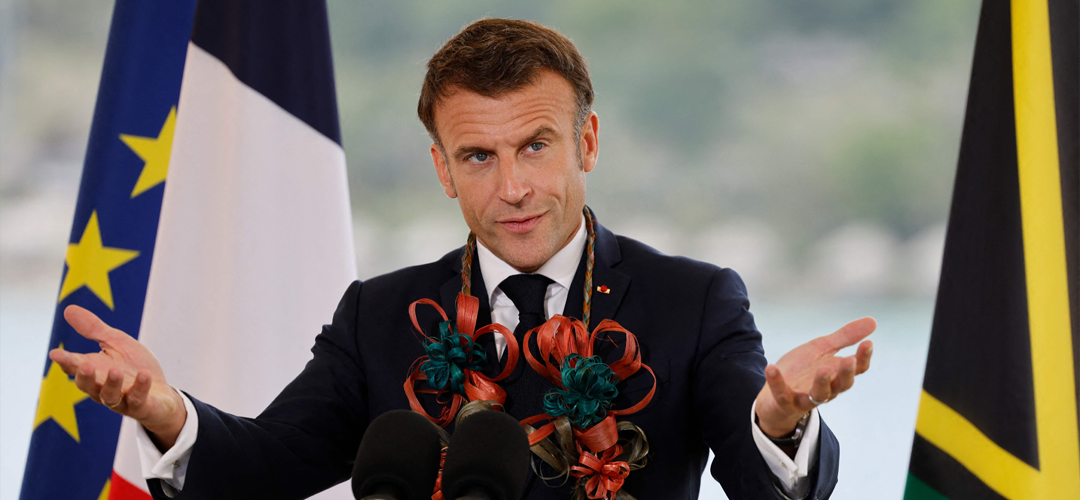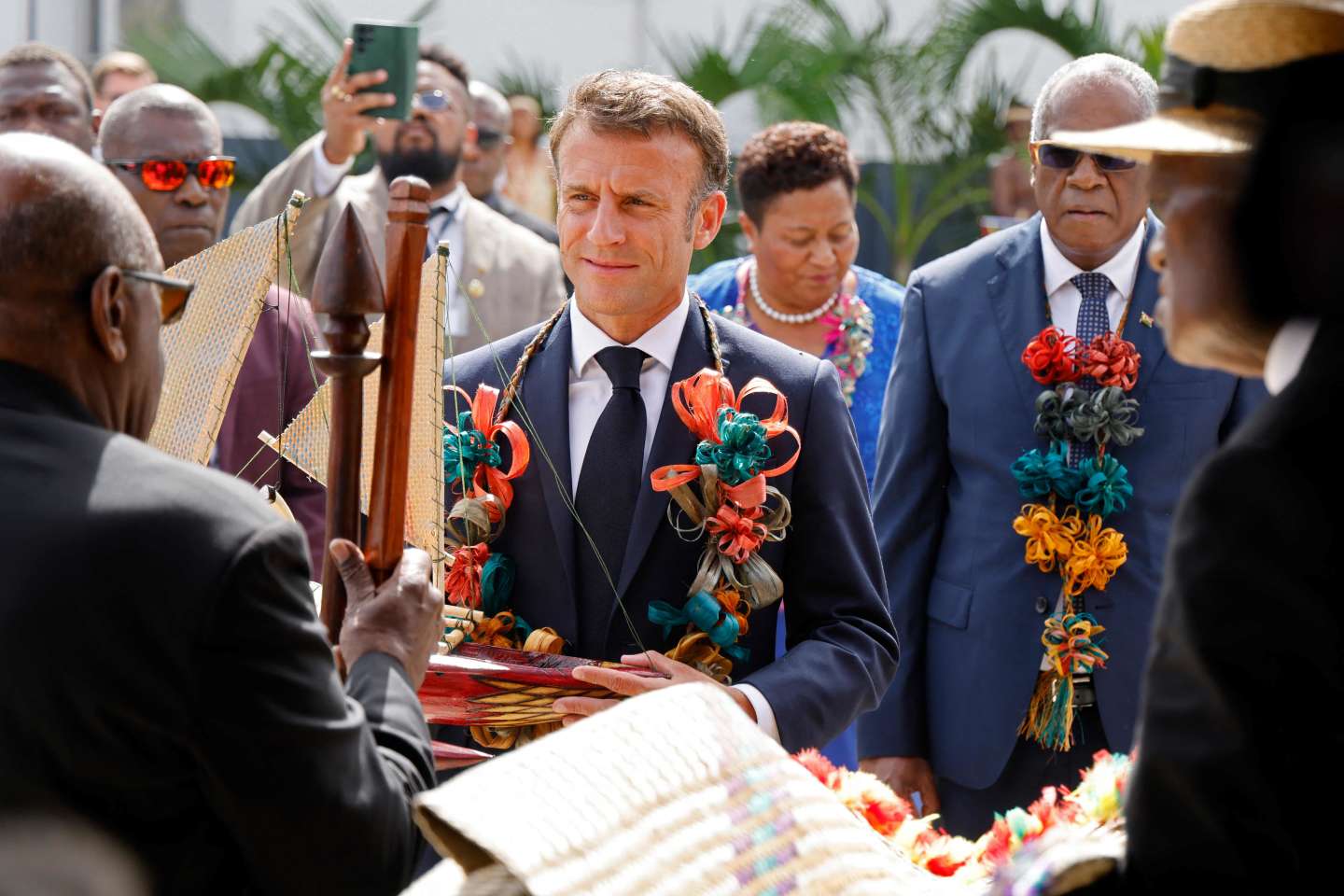France in the Indo-Pacific: a Return to the Past?
August 5, 2023 | Expert Insights

In the last week of July, President Macron of France went on an island-hopping tour of the South Pacific, landing at the French territory of New Caledonia and visiting Papua New Guinea and the Vanuatu Archipelago. On his way back to France, he made an overnight stopover in Sri Lanka. This was the first visit of any French President to the region since 1966 when Charles de Gaulle went around the island territories after having lost the jewels of French Colonies in Indo-China and Algeria.
Making a thinly veiled reference to China, Mr Macron pledged to defend the sovereignty of smaller islands nations of the Indo-Pacific where, he claimed, “a new imperialism is appearing, and a power logic that is threatening the sovereignty of several states, the smallest, often the most fragile.” In Sri Lank, President Macron said, “Sri Lanka and France are two Indian Ocean nations that share the same goal: an open, inclusive and prosperous Indo-Pacific”.
This is the message he has carried throughout this region. Whether it has reached the right audience remains to be seen.
Background
France has a historic and deep-rooted linkage with the Indo-Pacific. This presence can today be found in the French overseas territories of Mayotte, La Reunion, New Caledonia and French Polynesia. These were acquired in the 19th century, long after the British discovered much larger Australia and New Zealand. In a sense, France got hold of these islands because many other powers did not consider them significant enough to be worth the effort. However, when it came to pacifying the recalcitrant indigenous people of these islands, France showed no more mercy than other European colonisers.
However, lacking the natural riches of France's African and East Asian possessions, these remote Indo-Pacific territories remained on the fringes of the French colonial empire, more like outposts. After World War II, France remained on the sidelines as Indo-Asia prospered from the peace and tranquillity brought by American naval might.
Beijing's dalliance with the Solomon Islands last year, which ended with the signing of a defence agreement, has raised the stakes in the South Pacific, with the U.S. following suit by signing similar defence pacts.
With China emerging as another pole, Paris has been forced to re-evaluate its strategic investment in the Indo- Pacific if it wants to retain its relevance in the region. President Macron's visit aims to reiterate French determination to play a credible role in the affairs of the Indo-Pacific, with or without the collaboration of the U.S.

Analysis
With the rise of China as a challenger to the U.S., a new bilateral power calculus was taking shape in the Indo-Pacific. This left other countries in the region with little choice but to align themselves with one or the other. Neutrality was not an option.
France, under President Macron, has tried to change this narrative. As one of the most powerful member countries of the EU, a member of the security council and a nuclear power to boot, France has always made decisions independent of the continental bloc, which often toes the American line. Even in the 1960s, Paris took this line when it withdrew from NATO for some time to register its protest against the American domination of the military organisation. This scene was repeated in 2021 when the U.S. and U.K. lured Australia away from the lucrative nuclear submarine deal with France, reportedly pegged at $ 90 billion. Orders had been accepted, and production had already begun in France.
This does not mean France supports the Chinese point of view in the Indo- Pacific, even if it enjoys a flourishing trade with the latter. Its calls for a free and open Indo-Pacific do not align with China's worldview.
France sees itself as an “island state” in the Indo-Pacific on the basis of its overseas possessions. French overseas territories are quite different from British colonies. They have a much closer connection with the French mainland. So, in that respect, this self-description is quite true. These overseas territories provide France with the second-largest exclusive economic zone in the world. As a result, France's presence in the Indo-Pacific will not create any awkwardness within the E.U. All of the inhabitants of these island holdings are French citizens.
France would like to follow its own unique foreign policy in the Indo- Pacific, and not one of ‘my way or the highway,’ in which the concerns of the local populace and other Indo- Pacific nations will be taken into account. Critics have been quick to point out that when Mr Macron talks of the “new imperialism” in the Indo-Pacific, he conveniently overlooks the sins of colonial France-the “old imperialism.”
The India View
A greater presence of France in the Indo-Pacific should be welcomed by New Delhi, which is already in a deep and mutually beneficial strategic partnership with France. There is no guarantee that the Anglo-American powers would stand by India’s side in any confrontation with China. In such a situation, an outlier like France could be useful. The French have quite a military presence in the Indo-Pacific. The possibilities for India to work with France in this regard are endless.
President Macron’s visit has once again turned the focus back on the Indo- Pacific from Ukraine, which is widely accepted as the most contested maritime zone in the world. This is hardly surprising as the confluence of the Pacific and the Indian Oceans brings together the East and the West. Blessed with an abundance of natural resources in super -aquatic zone waiting to be exploited and surrounded by littoral states full of vitality and ingenuity, this region will be the economic heart of the future.
Assessment
- The Indo-Pacific region could do with a third pole. In that sense, France is fulfilling a purpose. Multipolarity will not solve all the problems of the Indo-Pacific and might complicate things even further, but it may help deescalate the tension between the principal protagonists.
- France's foray into the Indo-Pacific is also a big opportunity for the E.U. There is no E.U. Navy. But through the presence of France, the E.U. could expand its presence in the Indo-Pacific. The economic powerhouse Germany can chip in with monetary support in this enterprise. An open Indo-Pacific where all navies are free to operate benefits the whole world in the long run.
- Mere moral arguments are not going to work on their own. The French have to offer something more concrete to the Indo-Pacific countries if they wish to act as a regional power balancer.








Comments